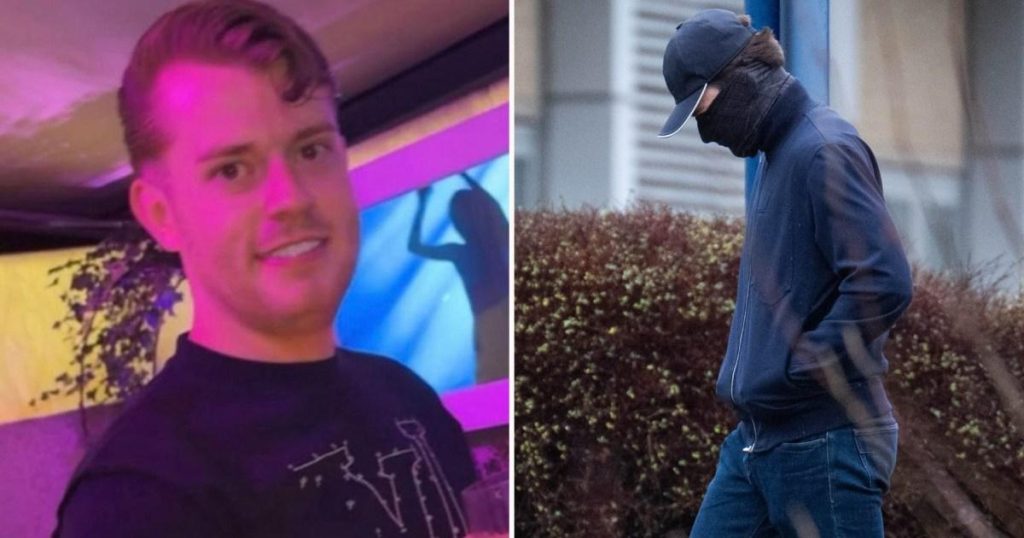The tragic death of Oliver White, a 27-year-old jewelry store manager, unfolded in the aftermath of a meticulously planned robbery at the 247 Kettles store in Richmond, London. On May 25th, White found himself the victim of a brazen heist, restrained with cable ties and held in a headlock while two men pilfered over 70 high-end watches, ranging in value from £3,000 to £70,000. The total value of the stolen goods exceeded £1.4 million. Just a day later, White’s life was tragically cut short when he was found deceased in a wooded area in Shepperton, Surrey. Prosecutors argue that the robbery directly led to White’s suicide.
Two men, Junior Kunu, 30, and Mannix Pedro, 37, now stand accused of conspiring to commit the robbery. Kunu is alleged to have been one of the two men physically present during the robbery, while Pedro is accused of orchestrating the plan. The prosecution’s case hinges on the involvement of two additional accomplices, Kyle Bowrage and Michael Ashman, both currently fugitives. Bowrage is specifically identified as the individual who scheduled a meeting with White, ensuring the targeted timepieces were readily available. CCTV footage reportedly captures Bowrage placing White in a headlock just prior to the robbery.
The store’s co-owner, Conor Thornton, a long-time friend of White, testified to the security measures in place at the store, including CCTV, panic buttons, magnetic lock doors, alarms, and a smoke system. Ironically, despite these precautions, the stolen watches were uninsured, mirroring a previous robbery at the company’s Egham store in 2021, where £250,000 worth of uninsured watches were stolen. Adding another layer of complexity, police had warned the owners about the risk of robbery just two months prior to the incident. Thornton confirmed that White had been made aware of these warnings. Both Thornton and co-owner Joe Riley were in New York on business during the robbery but returned immediately upon hearing the news.
Thornton described White as being in shock but not unduly alarmed during their meetings on the morning of May 26th, the day of White’s death. However, the defense painted a different picture, suggesting the meetings were fraught with tension and accusations. Defense attorney Tyrone Smith KC questioned Thornton’s account, implying that the owners’ criticism of White’s actions during the robbery contributed to his suicide. The defense highlighted specific questions allegedly directed at White, such as why he allowed three suspicious-looking individuals into the store, why so much valuable stock was readily accessible, and why the police weren’t contacted sooner.
The defense went further, accusing Thornton of suspecting White of being complicit in the robbery, insinuating an “inside job.” Thornton vehemently denied these accusations, rejecting any suggestion that he implied White’s involvement. This contentious exchange between the defense and Thornton forms a crucial part of the ongoing trial. The defense’s strategy appears to be shifting blame, suggesting that the pressure and accusations levied against White by his employers, following the robbery, ultimately led to his tragic decision to take his own life.
The trial revolves around the complex interplay of events surrounding the robbery and its devastating aftermath. The prosecution aims to establish the guilt of Kunu and Pedro in the meticulously planned heist, emphasizing the roles of the fugitive accomplices and the devastating impact on the victim. The defense, on the other hand, seeks to raise doubts about the sequence of events, suggesting that the store owners’ response to the robbery, rather than the robbery itself, played the decisive role in White’s suicide.
This case highlights the devastating consequences of crime, extending beyond the immediate financial loss to encompass the profound emotional and psychological impact on victims. The trial will ultimately determine the legal responsibility of Kunu and Pedro in the robbery, while the circumstances surrounding White’s death continue to raise crucial questions about support systems for victims of crime and the potential repercussions of accusations and blame in highly stressful situations. The uninsured status of the stolen watches also raises questions about risk assessment and management within the jewelry industry, particularly in light of previous robberies and police warnings.
The ongoing trial seeks to unravel the complex web of events surrounding the robbery and Oliver White’s subsequent death. The contrasting narratives presented by the prosecution and defense underscore the challenges in determining culpability and causality in a case marked by tragedy and unanswered questions. The court proceedings will continue to explore the sequence of events, the roles of the accused, and the factors that ultimately led to Oliver White’s tragic demise. The verdict will not only determine the legal fate of the defendants but also shed light on the broader issues of victim support and the responsibilities of employers in the aftermath of traumatic events.
The trial of Junior Kunu and Mannix Pedro serves as a stark reminder of the human cost of crime and the ripple effects it can have on individuals, families, and communities. While the court focuses on establishing legal accountability for the robbery, the broader context of Oliver White’s death necessitates a deeper reflection on the support systems available to victims of crime and the potential consequences of accusatory behavior in vulnerable situations. The case also raises important questions about risk management practices within the jewelry industry, particularly in light of repeated robberies and prior warnings from law enforcement. The trial’s outcome will undoubtedly have significant implications for the defendants, but its impact will extend far beyond the courtroom, contributing to a broader discussion on victim support, ethical business practices, and the long-term consequences of traumatic events.











